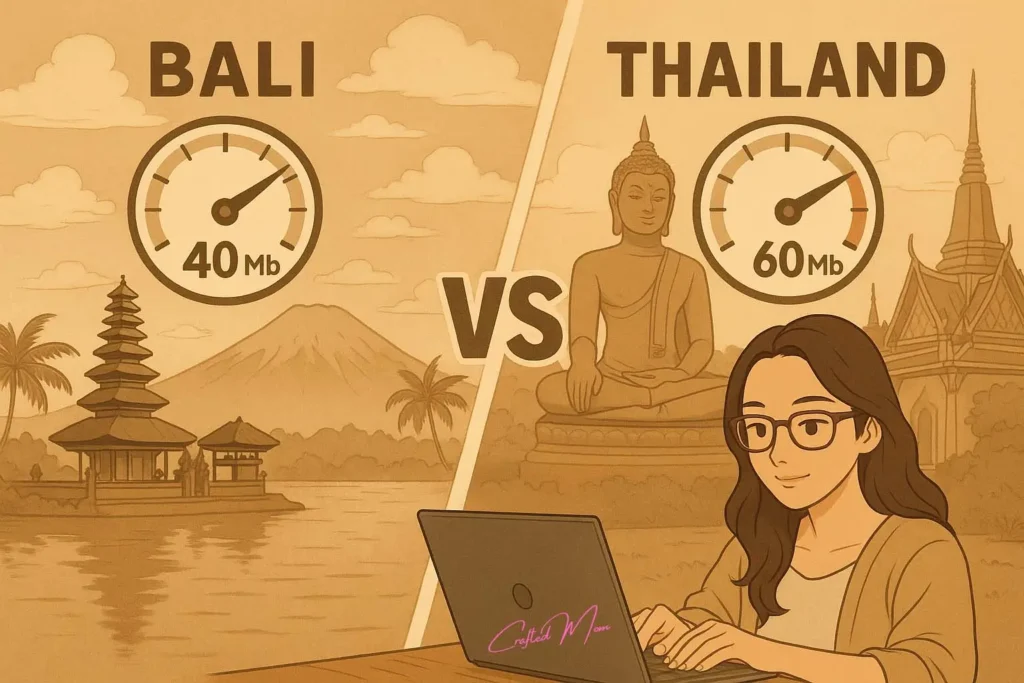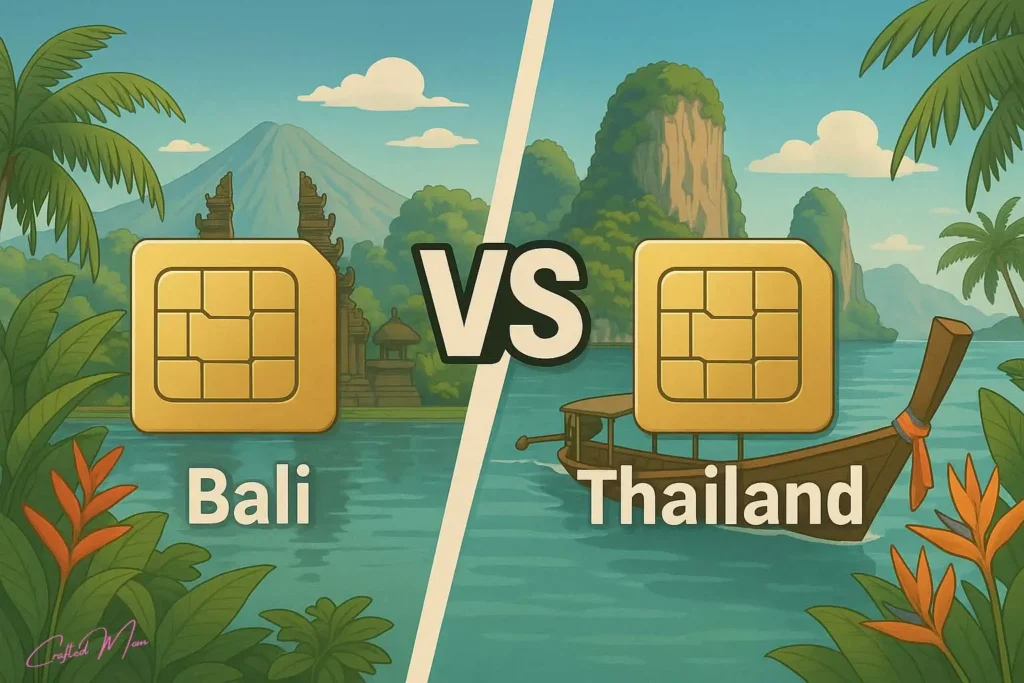If you’re a single mom dreaming of a fresh start or an affordable lifestyle in Southeast Asia, two destinations often top the list: Bali and Thailand. Both offer stunning scenery, warm communities, and a slower pace of life, but the big question is: which one is more affordable when you’ve got a little one in tow?
In this guide, we’ll break down the real cost of living for single moms, including:
- Transportation with kids
- Family-friendly housing
- Food costs (eating out & cooking at home)
- Visa options and ease
- Child-friendly activities & entertainment
- Healthcare, safety, and support systems
Bali vs Thailand Which Is More Budget-Friendly
Whether you’re looking for a short-term adventure or long-term relocation, this comparison will help you decide where your budget, and your family, can thrive.
1. Bali vs Thailand Transportation Costs

Getting around with a child means affordability, safety, and convenience matter more than ever. Here’s how Bali and Thailand stack up for day-to-day transportation:
Scooter Rentals
- Bali: ~$129/month for a brand-new NMAX scooter
- Thailand: $200+/month for a similar scooter in major tourist areas
- Note: Smaller scooters are available in both locations for $60–$100/month
For single moms, scooters can be handy, but always consider child safety gear and traffic conditions.
Taxis & Ride-Sharing
- Bali: Apps like Gojek and Grab are widely available and cheap, even in more remote areas
- Thailand: Grab is available in major cities like Bangkok and Chiang Mai, but
- Taxis are often more expensive
- Smaller islands (e.g., Koh Phangan) may have no ride-share apps, making taxis less reliable or overpriced
🏆 Winner: Bali
Bali offers more affordable and reliable transportation options, especially when it comes to scooters and ride-sharing apps, essential for single moms needing flexibility and safety.
2. Bali vs Thailand Accommodation Costs

As a single mom, having a safe, comfortable, and stable place to live is non-negotiable. Whether you’re looking for a budget-friendly studio or a cozy space with enough room for your child to play, Bali and Thailand offer different strengths.
Bali
Bali’s housing scene is all about guesthouses, homestays, and villas, with fewer apartment complexes.
- Decent private room in a good area: ~$650/month
- Local-style housing (modest but livable): $200–$300/month
- Villas with pools: Higher in price, but long-term stays often bring discounts
Be prepared to pay upfront (3–6 months) for better rates and note that utilities are often separate.
Thailand
Thailand offers a wider variety of housing, especially condos and apartments, which can be easier to manage for single moms.
- Modern apartment in a good area:
• $900–$1,200/month (high season)
• $600–$900/month (off-season) - Yearly rentals in cities like Bangkok or Chiang Mai are often cheaper and easier to find than in Bali
- Condos often come with security, pools, and elevators, ideal for moms with little kids
🏆 Winner: Thailand
Thailand wins for accommodation, offering more variety, better infrastructure, and stronger long-term rental options, especially in cities with amenities tailored to families.
3. Bali vs Thailand Food Costs

Food is a daily expense that adds up fast, especially when you’re feeding both yourself and a little one. Here’s how Bali and Thailand compare when it comes to meals and groceries.
Local Food (Eating Out)
- Thailand:
• Meals at local restaurants: $2–$3.50
• Portions are usually generous and flavorful - Bali:
• Warung meals (local spots): $1.50–$3
• Great value for rice dishes, soups, and satay
Eating out in either country is cheaper than cooking in many Western countries, but Bali tends to win for ultra-low-cost meals.
Western Food (Eating Out)
- Thailand: $5.50–$12 per dish
- Bali: $4–$7 per dish, especially in tourist-heavy areas like Canggu or Ubud
Western cafes are abundant in both, but Bali’s digital nomad scene makes Western food more accessible and slightly cheaper.
Grocery Shopping
- Thailand:
• Big chains like Makro, Lotus, and Big C offer bulk pricing, variety, and good deals
• Great for moms who cook regularly or need to shop for picky eaters - Bali:
• Fewer large supermarket options
• Local markets are great for produce, but packaged goods and imports are often more expensive
🏆 Winner: Split Decision
- Bali wins for eating out: especially if you stick with local warungs
- Thailand wins for grocery shopping: with better variety, pricing, and family-sized options
4. Bali vs Thailand Visas & Long-Term Stay Options

If you’re planning more than just a short trip, visa flexibility is a major factor, especially when traveling with kids. Between Bali and Thailand, one clearly makes it easier to stay longer without jumping through too many hoops.
Thailand
- Most nationalities get a 60-day visa-free entry or a 30-day visa-on-arrival (extendable)
- Tourist visa extensions: Easy and relatively affordable
- Long-term options:
- Education visas (including Thai language courses)
- Retirement visas (age 50+)
- Elite visa program for extended multi-year stays
- More flexibility for year-long stays without constant visa runs
Bali (Indonesia)
- 30-day tourist visa: ~$32
- Extendable once for another 30 days: +$32
- After 60 days, you must leave the country unless you’ve applied for a long-stay visa
- Long-term stay options:
- Social visas, KITAS, or business sponsor visas
- More complex and often require legal help or agents
Constant extensions or border runs can be stressful and expensive when you’re traveling with children.
🏆 Winner: Thailand
Thailand is clearly more visa-friendly for long-term stays, offering simpler, cheaper, and more flexible options, especially important for single moms looking for stability.
5. Bali vs Thailand Internet & Co-Working Spaces

As a single mom working remotely, reliable internet and a comfortable workspace aren’t luxuries, they’re essentials. Here’s how Bali and Thailand compare when it comes to staying connected and productive.
Bali
- Canggu, Ubud, and Sanur are packed with co-working spaces designed for digital nomads
- Popular spots like Dojo, Outpost, and BWork offer fast Wi-Fi, childcare perks, and vibrant networking
- Free Wi-Fi is available in most cafes and restaurants, though speeds can vary outside of major areas
- Great for moms who want a work-life balance with community support and flexibility
Thailand
- Internet speeds are generally faster and more stable across the country
- Even in smaller towns or islands, it’s easy to get reliable service with 4G/5G mobile data plans
- Fewer co-working spaces outside big cities like Bangkok or Chiang Mai, but many cafés are laptop-friendly
For moms working from home or juggling Zoom calls during naptime, Thailand’s internet wins for consistency.
🏆 Winner: Split Decision
- Thailand wins for fast, reliable internet: crucial for remote work
- Bali wins for co-working communities: perfect if you crave connection, networking, or a workspace outside the house
6. Bali vs Thailand Fitness & Gym Costs

As a single mom, staying healthy isn’t just about fitness, it’s also about stress relief and self-care. Whether you’re into yoga, weightlifting, or post-workout sauna sessions, here’s how Bali and Thailand compare.
Bali
- Local gyms (basic equipment): ~$3 per session
- Mid-range gyms (with sauna, ice bath, classes): ~$90/month
- Luxury fitness clubs (e.g., with cafes, coworking, spa-style amenities): ~$175/month
- Great variety in Canggu and Ubud, with wellness-focused communities and class-based studios (yoga, pilates, HIIT)
Thailand
- Basic gyms with good equipment + sauna/ice bath: ~$55/month
- Chain gyms like Fitness First or Jetts offer memberships in major cities
- Fewer luxury options overall, but affordable and widely available in places like Bangkok and Chiang Mai
For moms on a budget or short on time, Thailand’s gyms are budget-friendly and easy to access.
🏆 Winner: Split Decision
- Thailand wins for affordability: perfect for moms who want to stay fit without breaking the bank
- Bali wins for premium wellness experiences: ideal if you’re looking for holistic health and community
7. Bali vs Thailand Activities & Leisure

Whether you’re into surfboards, yoga mats, or occasional nights out, both Bali and Thailand offer plenty of ways to unwind. Here’s how they compare for popular activities and entertainment.
Surfing
- Bali: A surfer’s paradise, great waves, beginner-friendly beaches
- ~$3.50 per surfboard rental
- Thailand: Limited surf spots (mostly in Phuket), fewer consistent waves
- ~$9 per rental
Paddle Tennis
- Bali: Quickly growing sport with several active clubs
- ~$8.50 per hour
- Thailand: Less popular, but slightly cheaper
- ~$6 per hour
Yoga Classes
- Both Bali & Thailand:
- ~$8.50 per class, with tons of options for drop-ins or monthly passes
- Bali has more retreat-style yoga studios, especially in Ubud
Muay Thai & Boxing
- Bali:
- Private sessions: ~$10/hour
- Ideal for one-on-one training
- Thailand:
- Group Muay Thai classes: ~$13/session
- Great cultural experience and widely available in cities like Bangkok & Chiang Mai
Going Out & Drinks
- Thailand: Famous for nightlife, with more large-scale events like:
- Full Moon Party
- Waterfall raves
- Night markets & rooftop lounges
🏆 Winner: Split Decision
- Bali wins for surfing, paddle tennis, and wellness-focused activities
- Thailand wins for cultural martial arts, nightlife, and large social events
8. Bali vs Thailand Other Costs (SIM Cards, Cash Withdrawals, etc.)

Sometimes it’s the little things, like ATM fees or SIM card costs, that sneak up on your budget. Here’s how Bali and Thailand compare when it comes to everyday essentials.
Cash Withdrawals
- Bali:
• Many ATMs offer free cash withdrawals, especially with international-friendly banks like Permata or BNI
• Makes managing your money much easier if you rely on foreign cards - Thailand:
• Most ATMs charge a $5–$7 fee per transaction for foreign cards
• Fees can stack up quickly if you’re withdrawing cash frequently
SIM Cards & Mobile Data
- Both countries offer affordable SIM cards with large data packages:
- ~$5–$10 for several GB/month
- Reliable 4G coverage in most cities
- Thailand’s mobile networks are slightly more consistent, but both places are solid for staying connected
Tip: Stay connected effortlessly with Airalo, the world’s first eSIM store. Get instant access to local networks in Bali or Thailand. Try it now!
🏆 Winner: Bali
Bali wins for everyday convenience, especially with no-fee ATM access, making it easier to manage finances on a budget, a big plus for single moms keeping track of daily expenses.
Final Verdict: Bali vs Thailand Which One Is Cheaper?
So, when it comes down to dollars and daily life, which destination is more affordable for a single mom?
Cost Comparison Summary:
- Bali is slightly cheaper for:
✔ Scooter rentals
✔ Eating out
✔ Some short-term accommodations
✔ Co-working & wellness perks - Thailand is more budget-friendly for:
✔ Grocery shopping
✔ Long-term housing
✔ Visas & renewals
✔ Faster internet & connectivity
Which Destination Should You Choose?
Choose Bali if you value:
- A laid-back lifestyle with a tight-knit expat community
- Easy access to surf, yoga, and wellness retreats
- Affordable Western food options and trendy cafés
Choose Thailand if you prefer:
- Better infrastructure and internet
- Cheaper long-term stay options
- A bigger focus on local food, culture, and affordability
Final Recommendation:
If you’re watching every dollar, Thailand is slightly better for your budget. But if lifestyle, community, and comfort are bigger priorities, and you’re willing to spend a little more for premium experiences, Bali might be the perfect fit.
Your Turn! Would you rather live in Bali for Under $600 Per Month or Thailand? Drop your thoughts in the comments!
Frequently Asked Questions:
Which destination offers more affordable family-friendly accommodations?
Thailand generally provides a wider range of budget-friendly accommodations suitable for families, especially in areas like Chiang Mai and Bangkok, where options are more economical compared to Bali’s popular tourist spots.
How do daily expenses like food and transportation compare between Bali and Thailand?
Daily expenses such as food and transportation are typically lower in Thailand. Street food is abundant and inexpensive, and public transportation is more developed and affordable, making it easier for moms to manage daily costs.
Are there differences in the cost of activities and attractions for families?
Bali often offers cheaper prices for activities and attractions, including entrance fees to cultural sites and outdoor adventures, which can be more economical for families compared to similar experiences in Thailand.

